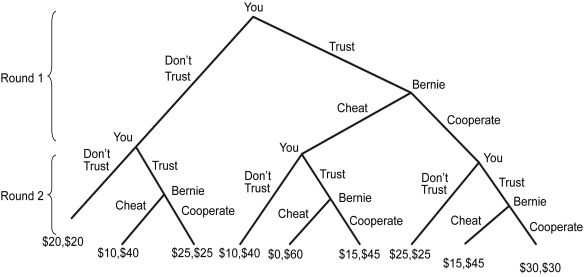Essay
Recall the trust game reported in the Evidence-Based Economics element in section 13.5.Consider the game where the trust game is played twice in succession.

Payoffs are the sum of payoff in each round.For example,suppose you choose Trust and Bernie chooses Cheat in the first round,then you choose Don't Trust in the second round (Bernie could choose either,because it does not get to his turn anyway).Then you earn $0 and Bernie earns $30 in the first round,and you earn $10 and Bernie earns $10 in the second round,so that your total payoff is $10 and Bernie's is $40.
a)Apply backward induction to this game.How do you and Bernie behave in the two-round version?
b)What would be the backward induction solution if the trust game is repeated three times? Four times? Twenty thousand times? Does this agree with what you read in the Evidence-Based Economics element in section 13.5?
Correct Answer:

Verified
a) In the second round,no matter what ha...View Answer
Unlock this answer now
Get Access to more Verified Answers free of charge
Correct Answer:
Verified
View Answer
Unlock this answer now
Get Access to more Verified Answers free of charge
Q23: Scenario: To win candy bars, Tom and
Q24: Scenario: Consider a trust game between an
Q25: The following figure depicts four simultaneous-move games.
Q26: Scenario: Miguel and Stephanie are competitors who
Q27: Mr.Smith wants to go on a vacation
Q29: In a game,a Nash equilibrium is reached
Q30: Refer to Evidence-Based Economics element in section
Q31: Scenario: Diana and Artemis can either jointly
Q32: Scenario: Diana and Artemis can either jointly
Q33: Scenario: Contiguous states often use tax policy